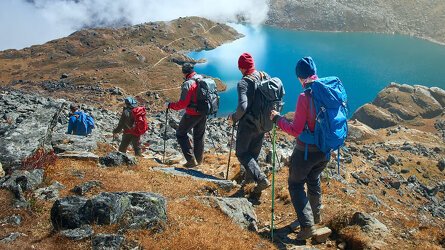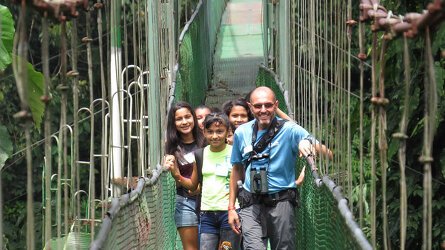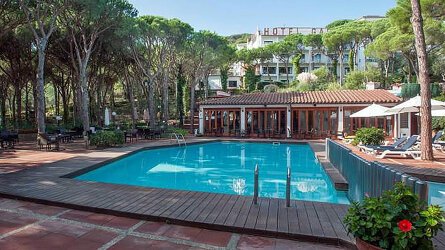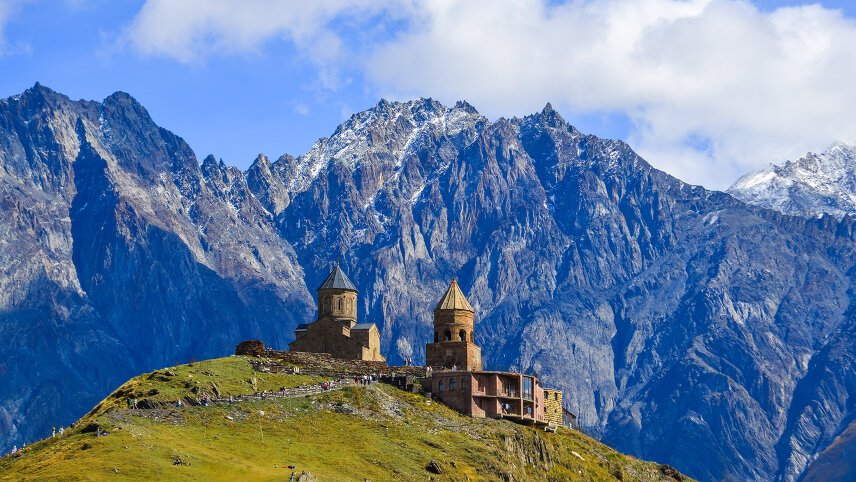Overview
Itinerary
Our trip starts in Tbilisi, the capital of Georgia. Our hotel is a short walk from the wonderfully restored historic centre, which has relaxing pavement cafes and bars. You can check into the hotel from mid-afternoon, though many flights don't arrive until the early hours of tomorrow.
We have the morning to rest at our hotel following what, for most people, will have been either a late-night arrival yesterday or early morning arrival today. If you prefer to make the most of your time, you can take in art galleries, markets or cafes on your own before the tour starts.
This afternoon, the tour begins. Much of Tbilisi can be visited on foot. We explore the old town to see the ancient sulphur baths, Sioni Cathedral and the beautifully decorated synagogue, built in the early 20th century. We also visit Rustaveli Avenue, the main artery of the city, and the Treasury of the State Museum, which has a fantastic collection of pre-Christian gold artefacts and jewellery.
This evening, we enjoy dinner at a local restaurant. (B/D).
Our first stop is the town of Gori, birthplace of the dictator Joseph Stalin. After visiting Stalin Square, where a huge statue of him once stood, we take a guided tour of the museum, which paints a very favourable view of his life and the role he played in the Soviet Union but is interesting nonetheless. Stalin's bulletproof train carriage, which he used to travel to the Potsdam Conference in 1945, lies in the museum grounds.
We have lunch at a local restaurant, then drive to Uplistsikhe, an enormous rock-hewn town with pre-Christian roots. It sits by the Mtkvari River and is notable for its unique rock-cut style and the co-existence of pagan and Christian architecture. Ancient temples and theatres can still be identified, and we walk up sandstone steps for a view across the river and plains. We continue to the mineral town of Borjomi and, finally, to the historic town of Akhaltsikhe, where we stay the next two nights. Over the course of today, we spend about five hours driving (B/L).
Today, we venture further into the southwestern region of Samtskhe-Javakheti, named after two of the first Georgian tribes, the Meskh and Javakhs and often described as the cradle of Georgian culture. We visit Rabati Castle, which, developed under the influence of different cultures, includes a church, mosque, minaret and synagogue. We continue along the road to Vardzia, past arid and stone-terraced landscapes and the famed 10th-century Khertvisi Fortress. The history of Vardzia is inextricably linked to Queen Tamar, Georgia's most famous and loved royal, who reigned during the 12th century.
Crowned as co-ruler by her father, Giorgi III, she became the first woman to ascend to the throne of feudal Georgia and is credited with extending and unifying Georgian rule with successful defeats against Muslim and Turkish forces. With Georgia's strong economic and political position, she founded the cave town of Vardzia, which became the cultural hub of Georgia. We explore the monastery to view remarkably well-preserved frescoes depicting the young queen. After visiting Vardzia, we return to Akhaltsikhe for the night. We'll be driving for about two hours today (B/L).
We head north today and travel along the Georgian Military Highway, the main road linking Georgia with Russia into the mountainous provinces of the Greater Caucasus. Our first stop is Ananuri to see the 16th-century fortress complex built by the warring dukes of Aragvi to control the main road. We spend the next two nights in Gudauri, a popular winter mountain resort-town. There are about 5hr 30min of driving today, much of it very scenic. (B/D).
Continuing our journey up and north through alpine meadows and mountain passes dotted with medieval watchtowers, we reach Dariali Gorge, a 9mi (14km) gash in the earth. We marvel at the snow-capped Mount Kazbegi (the highest mountain in Georgia), an extinct volcano that surrounds us and reaches to just over 16,500ft (5,047m).
We drive to the base of the hill and then take a walk across the meadow and a fairly steep and stony path up to the Tsminda Sameba Monastery – a 14th-century church built on a mountain peak at 7,200ft (2,200m). We have a khinkali masterclass at lunchtime today, in which we see the making of this Georgian speciality, a type of dumpling stuffed with spiced meat, fish or vegetables, and we try the result.
Later, we return to Gudauri for the night. There are about two hours of driving today. (B/L/D).
We journey down from the mountains today stopping in Mtskheta, the ancient capital of eastern Georgia and now a UNESCO World Heritage site. Georgia's conversion to Christianity occurred in Mtskheta in 337 CE and it is now considered one of the most important religious centres in the country. We visit the Church of Jvari, which is perched on a cliff overlooking the city, and the Sveti-Tskhoveli Cathedral, the first Christian church built in Georgia and its largest functioning cathedral.
Later, we continue to Telavi, a picturesque and fertile part of Georgia bordering the Great Caucasus range, which is known for wine making. There are around 500 varieties of vine in the country and the history, culture and lifestyle of Georgians are embodied in their wine. It is a symbol of Georgian hospitality, friendship, tolerance and perhaps a key to the mystery of Georgian longevity! We have about five hours of driving today (B).
We visit the Tsinandali family estate, which once belonged to the 19th-century aristocratic poet Alexander Chavchavadze. The residence consists of a summer home, garden and winery. We then continue to the town of Sighnaghi, where we have lunch and a wine tasting with a local family, before returning to Tbilisi. We'll be driving for about three hours today (B/L).
Our adventure ends in Tbilisi this morning. If you'd like to explore a little more, speak to your sales representative about extending your stay (B).
Trip Inclusions
- Travel the Georgian Military Highway and see towering Mount Kazbegi
- Visit UNESCO-listed churches and fortresses
- Walk among pre-Christian cave houses in Uplistsikhe
- Embark on a fascinating walking tour of vibrant Tbilisi
- Create khinkali dumplings in a cooking masterclass
- 2 Superior nights (hotel), 5 or 6 Classic nights (hotel, number of nights depends on flight arrival time)
- Travel by private minibus
- All breakfasts, four lunches and three dinners
- Itinerary and inclusions are subject to change
- Price is for land, cruise and internal flights as specified. Flights not specified are not included

From classic small group tours & family adventures, to walking holidays, cycling trips and self-guided tours. Read more

Exodus chooses their Leaders carefully. Professional, dedicated and are passionate about sharing their home countries. Read more

Wherever possible, Exodus chooses properties that are locally owned and that reflect the area you are visiting. Read more
Availability
 USD
USD
A definite departure means minimum numbers have been reached for this departure to operate. Your Global Journeys Travel Advisor will check the availability of your departure date when you enquire. Additional savings may apply. We guarantee the lowest price in USA. T&C’s apply.
Tour & cruises prices are per person. Prices shown have savings applied, are subject to availability and may be withdrawn at any time without notice. Pricing and trip details are correct at this point in time, however are subject to confirmation at the time of booking and are subject to change by Exodus. For cruise itineraries, cabin images are sourced from Exodus. These should be treated as indicative only. Cabin inclusions, upholsteries and room layout may differ to the image(s) shown depending on the ship selected and your sailing dates.









